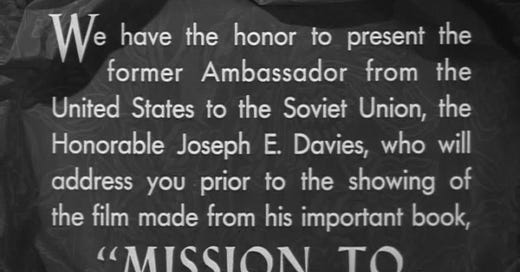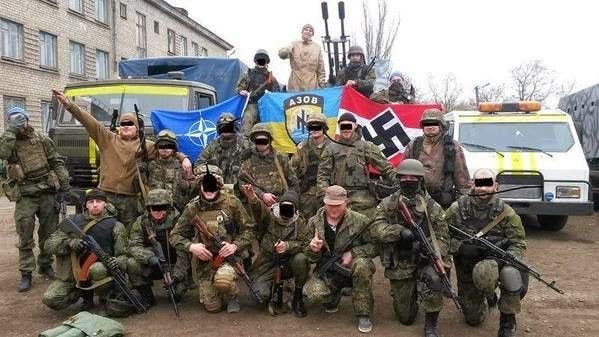Know your history. This film, made in 1943 is based on the book by Joseph E. Davies, Wall Street lawyer, whom FDR sent to Russia, the Soviet Union, to find out the real truth of what the Soviet Union was, and why it was so important to understand and appreciate it. I highly recommend this accurate historical film, told by a real American, to the American people.
Here is his opening statement, spoken by the author himself:
When I was your ambassador in Russia, I little expected to write Mission to Moscow, much less to see it projected on screen. But when Germany attacked Russia, the Soviet Union became one of the nations fighting Hitler, and it was a desperate hour. If Hitler were to destroy the Red Armies, and to smash the Soviet Union, the three aggressor nations [Germany, Italy, Japan] would dominate Europe, Asia, and Africa.
The riches of these three continents, and the enslaved labor of three quarters of the population of the world, would be harnessed to conquer the rest of the earth. The Americas would be next, us. Unity among the forces fighting Hitler was vital.
Nothing as I saw it was more important than that the fighting nations should understand and trust each other. There was so much prejudice and misunderstanding of the Soviet Union, in which I partly shared, that I felt it was my duty to tell the truth about the Soviet Union as I saw it, for such value as it might have.
What makes this film so remarkable is that it foreshadows many of the very same issues facing the world today. Just as back then, there is so much prejudice against Russia now. The tragedy is that the USA and Europe forgot the lessons of the past, and allowed the same prejudices to come back. And the same kind of forces that threaten world peace today. Basically, people in the West have got the story backwards.
So in order to begin to bring people back to reality, this film addresses many of the lies spread about the USSR, just as lies are spread about Russia (as well as other countries that are falsely accused, and made into adversaries.)
Some key points:
Need for Objective Information
FDR invites his friend from their college days, who is now a highly successful lawyer and business man to be Ambassador to Russia. He wanted an objective viewpoint, which he knew he could get from his friend.
Invasion of Ethiopia by Italy in 1936
There is a scene at the League of Nations, created after WWI, to solve international problems. The Emperor of Ethiopia addressed the assembly over Italy’s brazen invasion of his country, and asked for the League and its nations for their support. Nobody helped (think NATO in Yugoslavia, Libya, Iraq. Think Israel in Palestine).
Russia Asks for Collective Security in 1936, and Ever Since the Fall of the USSR
He’s followed by the Soviet Ambassador to the League, who pleads for collective security.
My comment: It is striking to me, that Russia has been emphasizing the idea of collective security after the fall of the USSR. Russia asked to join NATO with that end in mind, and was rebuffed.
Since 1991, Russia has been surrounded by more and more countries which were by agreement with the West, never intended to be part of NATO. As then, Russia’s numerous requests for collective security were rebuffed most notably in December 2021. That, plus the massive shelling and impending attack by the Kiev regime on its eastern area of Donbass were the direct precursor to Russia preempting that attack in February, 2022.
Creeping Fascism
Following the 2014 Coup initiated by the United States in Ukraine, racist fascist ideology came back to Ukraine….and the US has supported it. Trump supplied the regime with weapons. So did Biden. The arming of Ukraine, the overthrow of its democratically elected president on full display.
The takeover of Germany by Hitler and Italy by Mussolini were also backed by US financial backing, aka meddling. Hitler himself had many American friends.
Germany then:
Ukraine Now.
And now we have this:
This is the guy who said, “We’ll coup whoever we want to”.
Davies went to Berlin first, to recommend general disarmament, and was rebuffed. From 1991 on until 2022, Russia continuously proposed collective security that favored no country over another, and was rebuffed.
Davies’ Next Stop: Moscow
At the train station, Davies’ porter sees a woman at the head of the train. He asked where is the engineer for the train, and he learned that the woman is the engineer. Soviet women were given equal rights with men 40 years ahead of the Women’s Liberation Movement of the 1970s.
He has a cordial meeting with the Russian President, which is more ceremonial. He expresses his admiration for FDR, which showed up in subsequent negotiations between the US and the USSR. Davies asks, what if war should come? And the President replies, “We will defend ourselves, we will be ready”.
He then visits the British Embassy, where he meets the Polish Ambassador, who says, “We have a saying, ‘a Russian is merely an unfinished Pole”. So Poland’s attitude towards modern day Russia is not surprising.
Sabotage
Even an American factory manager warned Davies that, contrary to American claims of Russia paranoia, there was widespread evidence of deliberate sabotage.
Next Scene: Some Familiar Names Even Today
The next scene shows Davies visiting an important mining area, the Donbass. This area is central to the current war in Ukraine. Donbass has been an integral part of first the USSR and of Russia. Also mentioned as part of the Soviet Union were the cities of Kharkov and Odessa. These names are prominent nowadays. These were then and are still, culturally, Russian cities.
Profit Sharing As a Natural Form of Incentives
Long before American workers participated in profit sharing, Soviet factory workers shared in profits above the planned amount.
“The Valley of the Dniepr River Is One of the Most Fertile Districts in the World”
And in modern Ukraine, it’s being sold off, privatized by US Corporations. This is another bone of contention, a consequence of the US coup in 2014.
Davies Meets Two High Soviet Officials
He noted that he was impressed that, despite some mistakes, Davies recognized the speed at which industrialization was taking place. He also observed that the factories did not seem permanently situation. “I could think of no other period in history where so much has been done in so short a time”. However his Soviet hosts told him that the reason for the moveability of the factories was due to the fact that they might have to be moved.
In fact, when the Nazis invaded, Russia rapidly removed and relocated the factories out of reach of enemy forces.
Diplomatic Digs
At a formal diplomatic ball, a Japanese official, probably the Ambassador, asks the daughter of the Soviet ambassador to the League of Nations, Litvinov about her activities and she says that she practices parachuting. The Japanese, fishing for intelligence, asks how many are involved in that. Ms. Litvinova says she doesn’t know and asks the Japanese what kinds of sports they engage in.
He says they do different sports. To which Litvinova gives a little cut. She notes she has seen pictures of what ‘sports’ the Japanese were engaging in, in China. She’s referring to mass atrocities, such as the slaughter in the Chinese city of Nanjing. China suffered at least 20 million dead following Japan’s invasion of China in the 1930s-until the Chinese finally defeated Japan, along with Russia’s crushing of the Japanese army in Manchuria.
The American people knew about that during WWII, but it’s long been forgotten by Americans, who can’t understand why China does not appreciate foreign armies and navies off of China’s coast.
Molotov Warns Davies
There are uncomfortable parallels between Nazi expansionism in the 1930’s and NATO expansionism, especially after the Soviet Union ended. See my notations [in brackets.]
The Soviet offical says to Davies:
We in Russia have learned to judge our neighbors by what they do, and not by what their representatives say.
And what is happening in the world today? Not a very pleasant prospect, Mr. Davies. One nation [Italy under Mussolini] has already invaded another without provocation or excuse, and contrary to its legal obligations. Still another aggressor [Germany] is attempting to overthrow the legal government of its neighbor [Spain] by sending men and equipment to support the revolt.
The little nations, in 1938, Austria, Czechoslavakia [in 2025 Libya, Yugoslavia, Syria, Palestine?] tremble, trying to walk the tight rope between the great powers. Their only defense is to utter helplessness. But whom can they trust? On whom can they depend?
It's the devil's gamble. So they smile on everyone and hope for the best. The weaker the country, the stronger the smile. But what about the great powers who could oppose aggression? Instead of standing together, they make deals with the enemy.
So, in 1938, France and the UK made a deal with Hitler, the Munich Agreement, and let Germany take Czechoslavakia. It’s even worse now, with the US supplying Israel in its wars against Palestine, Lebanon, Syria. And possibly Iran.
He further points out how countries are subverted from the inside. Back in 1936, the Nazi fascists said, “We have four columns in front of Madrid, and a fifth column inside the city”. So it is especially ironic that the US and EU supported a fifth column in Ukraine.
Sabotage: An Important Factory in the Defense Complex Was Blown Up
A series of such explosions indicate a concerted effort to undermine the Russian economy. The scene then shifts to a series of Soviet officials being arrested.
The Purges: A Key Factor in the Anti Soviet Narrative
Following the arrest of some officials, whom Ambassador Davies had known personally, the world is outraged at their arrest. The Moscow Trials were a major factor in how the anti Soviet narrative came about. It was assumed in the US media that the Soviet Union was simply brutal and unjust. However Davies determined, based on his attendance at the trial, that they were justly accused of betraying their country.
This is a key factor making this film so important. A trustworthy US official showed that the Soviet leadership had good reason to believe that the Soviet Union was being undermined by the two Fascist powers, Germany and Japan. Again, the parallels between then and now, with the numerous color revolutions and psychological and information warfare actions against Russia should be obvious.
War Clouds Gather
Following the trials, Davies visits several capitals to assess the situation. His question: What are the intentions of Germany’s Hitler and Italy’s Mussolini? He gets mixed answers from officials in Poland, Austria, Netherlands, Yugoslavia.
But when he returns to Moscow, the Chinese ambassador visits him and takes him to a hospital, where victims of Japan’s invasion of China are being treated.
A Soviet doctor says,
Those who work to save people cannot keep up with those with the power to destroy
And so it was that the United States, China, and the Soviet Union allied to stop Japanese aggression in China and in Asia. In the end, the Soviet army and China inflicted defeat on Japan in China. Much of the war was in China.
However, despite the massive defeat of Japan’s army in Manchuria, the Japanese chose to surrender to the Americans, presumably because the Americans promised to preserve the Japanese Emperor, which the Soviets probably would not have done.
The Farewell Dinner
In the farewell dinner, Premier Molotov and Ambassador Davies had the following exchange:
Litvinov: The pleasure of having you here tonight is marred only by the fact that this is a farewell dinner. You, Mr. Ambassador, have done what no other foreign diplomat has been known to do in this country. You have done your best to understand our country.
What is going on here, the motives behind our doings, and the aims in front of them. If you will, as I'm sure you will, pass on the results of your observation and unbiased judgment to your government and to your country, you will contribute more to the friendly relations between our two countries than any other diplomat in the history of the Soviet Union.
Davies:
You have commented on the sympathy and understanding which exists between your country and mine. I believe that is preeminently true. It is my belief that both peoples are seeking to improve the lot of the common man. That is the end to which we are striving.
Our methods are different. We believe that ours are the best, but we concede that you have the right to maintain that yours are the best. I came here with an objective mind. I'm leaving with an objective mind, possibly less objective and more friendly, because of the kindnesses that you and your government have extended to me as a representative of my country.
In conclusion, I would like to say to everyone here that I'm going to miss you very much. And I hope to see you many times again, wherever our paths may cross, I'm sure that my American staff will want to join me in raising our glasses to you,
Mr. Litvinov, to your associates, and to the traditional friendship of the peoples of our two countries.
Reality Sets in: Hitler invades Austria
The Austrian foreign minister had told Davies that he trusted Hitler and didn’t think he would invade. But as the farewell dinner ends, Litvinov gets a message about Hitler acquiring Austria under German control.
The Final Meeting: Davies Meets Stalin
Stalin warns Davies that England and France will probably not protect Czechoslavkia, in which case, Stalin told him that Collective Security is the only thing that can save Europe from a major war. Absent that, the Soviet Union would have to find its own way to protect itself. In fact, he said that England wanted Germany to fight Russia, and when both were exhausted, England would come in to pick up the pieces.
My comment: It’s ironic that Russia, following the end of the Soviet Union, and specifically under Putin, have urged again and again, for a collective security agreement. Only to be constantly rebuffed, starting with the betrayal of the 1990 promise not to expand NATO, if Germany reunited and joined NATO.
This scene predicts the Molotov-Ribbentrop pact, which Russia knew would only buy time before the German invasion of Russia.
Tellingly, Stalin also said that the governments of the West were acting contrary to the interests of their own people because they were encouraging war.
My comment: It’s highly ironic that in the current war in Ukraine, again, it is England and France (and Germany) who are encouraging a war against Russia, and again, contrary to the interests of their own people.
Sure Enough, Hitler Invades Poland: WWII Begins
On Davies’ return to Washington, he tries in vain to get the Congress to promise aid to any country attacked by Hitler. But Congress refuses. And sure enough, Hitler invades Poland. Again, Davies steps in. He convinces FDR that the Soviet army will win, if given help.
There's no doubt in my mind that the Red Army has a good chance of beating Hitler. If only more of our people realize that. There's been so much prejudice stirred up about the Soviet Union that the public hasn't been given a chance to know the truth.
Mr. President, a few years ago, you called me into this room and gave me a job. It was a bigger job than I thought at the time, and I don't think it's finished yet. I'd like to lay those ghosts that our fascist propagandists are brewing up about Russia and tell the people of this country a few facts.
Well guess what, nothing has changed. It’s time to tell the people in the year 2025 in this country a few facts.
An Exhortation to the Present
Davies continued to exhort the people not to heed the propaganda against Russia. Unfortunately, times have changed and the forces in the West who supported, or acquiesced to it, have become dominant. The movie ends with this statement:
…we pledge to work for a new world with justice and equality for all, to restore the dignity of man as an individual and not as a slave to any state or master, so that you, to whom the great future belongs, shall be able to reply as we have not to the old angry cry of Cain, am I my brother's keeper?
With the answer, yes, you are….Yes, you are.
You are your brother's keeper.
Conclusion
Yesterday, at the market, I met an old man. He was born in India, before the British divided it, separating him into Pakistan. He asked me where I am from, and I said, America.
He replied, “Ah America….I remember John F. Kennedy, he wanted peace, but since his death, America has been at war, always. Why?…why can’t America be friends with other countries?” He understands Russia’s position, which has not changed since it fought fascism in WWII. It’s us who changed.
This movie will I hope change your mind about Russia…before it’s too late and the war to end all wars, nuclear war, is brought about.















Share this post